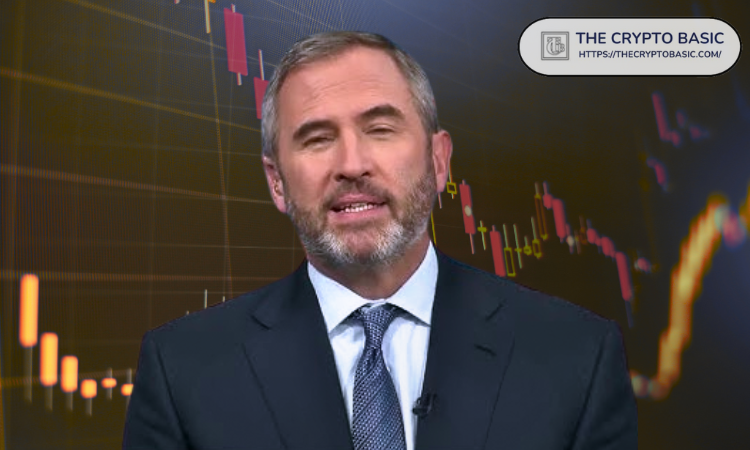Ripple CEO Brad Garlinghouse and other prominent crypto stakeholders will participate as witnesses at the upcoming Senate hearing on the crypto market structure.
The Senate Banking Committee has scheduled a full committee hearing on the proposed Market Structure legislation for next week.
Last month, four Republican Senators, Tim Scott, Cynthia Lummis, Bill Hagerty, and Thom Tillis, introduced the legislation.
The legislation aims to resolve the longstanding regulatory confusion in the cryptocurrency market by specifying the conditions that determine which token qualifies as a security or a commodity. While the SEC regulates assets with securities tags, the CFTC oversees those classified as commodities.
Garlinghouse to Attend as Witness
Less than two weeks after its introduction, the Senate Banking Committee has scheduled a full committee hearing on the legislation. Eleanor Terrett, the host of Crypto in America media outlet, reported that the hearing will take place on Wednesday, July 9, at 10 a.m. ET.
Notably, Ripple CEO Brad Garlinghouse will appear as a witness. Other industry stakeholders expected to testify include Summer Mersinger of the Blockchain Association, Chainalysis CEO Jonathan Levin, and Dan Robinson of Paradigm.
Justifying Garlinghouse’s Inclusion
While Terrett highlighted several leading industry figures as witnesses, many view Garlinghouse’s inclusion as fully justified.
Attorney John Deaton has highlighted that Ripple and XRP exemplify the regulatory uncertainty that plagues the crypto industry. He cited a series of events illustrating how Ripple and XRP have been treated inconsistently by U.S. regulators.
According to Deaton, Ripple Chairman Chris Larsen met with the Federal Reserve, the SEC, and the U.S. Treasury as early as 2013, explaining XRP and its underlying technology, XRP Ledger (XRPL). The following year, the U.S. Government Accountability Office (GAO) referred to XRP as a virtual currency.
In 2015, Ripple reached an agreement with the U.S. Financial Crimes Enforcement Network (FinCEN) to comply with banking laws after being fined $700 million over a sale involving Roger Ver.
According to Deaton, the SEC and FinCEN were in an information-sharing arrangement, which gave the securities regulators exclusive access to Ripple’s information.
Three years later, on June 14, 2018, the SEC’s enforcement lawyers conducted an internal Howey assessment of XRP to determine whether it constitutes a security. However, the lawyers did not recommend an enforcement action, as mentioned by Judge Analisa Torres in the Ripple case.
In August 2018, Ripple executives, including Garlinghouse, met with the SEC to resolve the lack of clarity regarding XRP. Deaton suggested that the Ripple execs visited the SEC shortly after the agency gave Bitcoin and Ethereum a free pass via the infamous Hinman speech.
Deaton stated that during the meeting, the SEC did not inform Ripple about any securities law violations, despite having substantial knowledge of every XRP transaction.
FSOC and Coinbase Call XRP a Currency
Furthermore, the Financial Stability Oversight Council (FSOC) published a report in 2019 co-signed by the SEC and CFTC chairs, which referred to XRP as a virtual currency.
That same year, Coinbase informed the SEC of its intention to list XRP after its evaluation framework determined that the coin was not a security. However, the SEC did not reject Coinbase’s request, and the exchange proceeded to list XRP. The exchange also promoted XRP’s utility in cross-border settlements, alongside the stablecoin USDC.
In June 2019, MoneyGram disclosed in an SEC filing that it would be utilizing XRP for cross-border payments. Deaton said the SEC knew that MoneyGram would sell XRP in the secondary markets but did not object.
According to Deaton, XRP is traded across more than 200 crypto exchanges globally, with several countries declaring it a non-security. Despite these facts, the SEC still sued Ripple in December 2020, alleging that all XRP transactions since 2013 were investment contracts.
Glad @bgarlinghouse is a witness for Market Structure. No better example than Ripple & XRP regarding both lack of clarity and confusion between agencies. FACTS:
2013: @Ripple co-founder @chrislarsensf meets w/ @federalreserve @SECGov @USTreasury, etc., explaining XRP & XRPL.… https://t.co/Tn7r9hWRmF pic.twitter.com/jrzOcwObPr
— John E Deaton (@JohnEDeaton1) July 3, 2025
Deaton argues that despite various agencies—including the FSOC and FinCEN—referring to XRP as a currency, the SEC persisted in classifying it as a security.
Given the regulatory inconsistencies surrounding XRP and Ripple, Garlinghouse’s appearance at the upcoming market structure hearing could push Congress to provide the clarity the crypto industry has long awaited.
DisClamier: This content is informational and should not be considered financial advice. The views expressed in this article may include the author's personal opinions and do not reflect The Crypto Basic opinion. Readers are encouraged to do thorough research before making any investment decisions. The Crypto Basic is not responsible for any financial losses.



